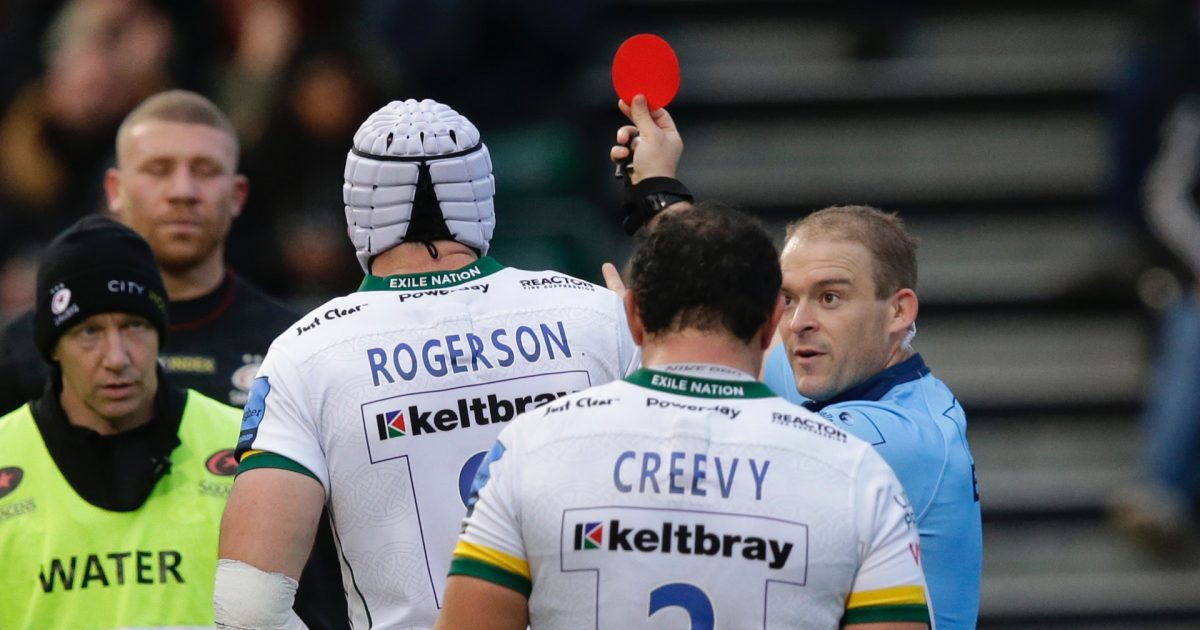Canny ref message from London Irish amid glut of Premiership reds

Declan Kidney has got no hang-ups about the high number of Gallagher Premiership matches that London Irish have been involved in this season that have featured red cards. Heading into this weekend’s round 21 fixtures, 18 red cards have been brandished so far across the English league and six of those sending offs have happened in games involving the playoff-chasing Exiles – three reds for them and three for the opposition.
Incredibly, Irish head into Saturday’s near sell-out fixture at home to Northampton having seen referees show a red card in their last four Premiership games. They were twice on the receiving end of going a man down while they were numerically advantaged in two other matches when Bristol and Worcester each lost a player.
There is no exact science surrounding the red card glut. Look at how Adam Coleman had his mid-February red versus Saracens rescinded at his resulting midweek disciplinary hearing while Curtis Rona was banned for three weeks following his early March 12 bath at Leicester.
It would be understandable if Kidney had a moan about Irish being involved in so many matches with either his own or opposition players lost to red cards, but the bigger picture of the game’s safety is most prominent in his thinking. “The referees have a responsibility to bring safety into it,” he told RugbyPass.
“A lot of the red cards have come due to high tackles. In our case, we have had two (recent) red cards but one of those was rescinded because even though it looked like it [a red card] and it was a difficult one for the referee to judge when you are 60, 70 metres away from a big screen, but as it turned out it was our player that was knocked out.
"…my first six months here I was getting absolutely battered set-piece wise."
After exiting Super Rugby @londonirish Wallabies prop @omdhoskins only started truly learning the dark arts in @Champrugby and it was a steep learning curve, writes @heagneyl https://t.co/k3nVwzI7uy
— RugbyPass (@RugbyPass) March 6, 2022
“Referees are having to stick at it because the world we live in now, they are the adjudicators of what goes on. It is a difficult task that they have and we just have to work our way around it. There is no point backing off it [the clamopdown] now otherwise we are not going to encourage kids to come into the game.”
Coping with a red card isn’t something London Irish specifically train for but they have a strategy regarding the loss of a player to a ten-minute yellow card. “We have a way of adapting should we have a yellow card. If it is 14 we adapt our style of play. We don’t stop playing, there is a just a few nuances we change around but if you practice for a red card it’s a bit of a self-fulfilling prophecy then.
“We don’t go out of our way to do it but when something happens at training for whatever reason and you are down to 14, the players adapt to it and that is part of the plan that we have tried to get the players to understand, to adapt.
“Not to any given situation because then you are trying to artificially create every situation that comes up but what we do is we practise imperfection if you like. If there is a loose ball in matches you play on and it’s how you adapt to that and we do put a good bit of effort into that side of play.”
What Kidney has enjoyed is the defiance his Irish team have shown when a red-carded man down. They won both games against Saracens, in November and again last month, while they gave Leicester a rattle despite Rona exiting just before the 30-minute mark. “If you are lucky enough to work with players that go like that that is always your ultimate goal as a coach – to work with players who have that desire.
“If they have that then everything else can be worked on but the one thing you can’t coach is attitude and our lads’ attitude is top class so they are all ambitious, they all want to do as well as they can, to work hard and see where it brings us. That is the fun of being with London Irish, the expectation isn’t there, people would be maybe waiting for us to fall down but we are not worried about that.
“We are just concerned about doing as well as we can in each match and see where we end up at the end of the season and enjoy each other’s company. I’m not big into fancy names but Exiles is a good name for us, We have about 13 different nationalities here. We are an English club funded by Ireland in an English league so it’s enjoyable… the lads seem to be enjoying their game and for me, that is a very important side to it, that the lads are looking forward to their matches.”





































































